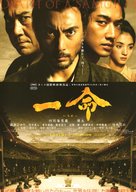Reviews provided by RottenTomatoes
A.O. Scott, New York Times: More moving than shocking, it proceeds slowly and gracefully, and the few scenes of bloodshed are emotionally intense rather than showily sensational. Read more
Mike D'Angelo, AV Club: It doesn't help that Miike shot Hara-Kiri in 3-D, which as usual accomplishes nothing save for making the action look as if it's taking place during a partial eclipse of the sun. Read more
Scott Tobias, AV Club: The Miike of old resurfaces for the climactic sequence, but Hara-Kiri seems intent on proving that his instinct to shock runs secondary to a more consistent instinct to rebel. Read more
Barbara VanDenburgh, Arizona Republic: A quiet, narratively layered period drama with a focus squarely on character. Read more
Mark Feeney, Boston Globe: Miike can't seem to get enough of Hanshiro's heroics. That's not just visual excess, though. Read more
Mark Olsen, Los Angeles Times: Miike brings a formal, elegant restraint to his usual flair for wild theatrics. Read more
Rene Rodriguez, Miami Herald: Hara-Kiri: Death of a Samurai reveals yet another facet of this always-unpredictable filmmaker: a flair for compassionate, humane melodrama. Read more
Mark Jenkins, NPR: Ryuichi Sakamoto's score, Nobuyasu Kita's cinematography and the performances are all impressive. Read more
Elizabeth Weitzman, New York Daily News: It's an indelible picture of a cold-hearted ruling class that has allowed self-interest and hypocrisy to override its own humanity. Read more
V.A. Musetto, New York Post: A 3-D epic that, despite its title, is more of a soap opera than a swordplay thriller. Read more
Andrew O'Hehir, Salon.com: With this sober, mournful, gorgeously mounted and marvelously acted drama, Miike connects himself to the greatest traditions of Japanese film and to the period of historical self-examination that followed the debacle of World War II. Read more
Keith Uhlich, Time Out: Miike turns the format's inherent limitations, especially the tendency toward visual murkiness, to his advantage, fully immersing us in a world suffused with moral and ethical rot. Read more
Michael Atkinson, Village Voice: It may well be Miike's best film, a patient, ominous piece of epic storytelling that conscientiously rips the scabs off the honorable samurai mythology. Read more

